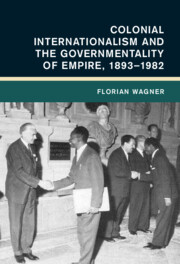Book contents
- Colonial Internationalism and the Governmentality of Empire, 1893–1982
- Global and International History
- Colonial Internationalism and the Governmentality of Empire, 1893–1982
- Copyright page
- Dedication
- Contents
- Figures
- Acknowledgments
- Abbreviations
- Introduction
- 1 “More Beautiful than the Nationalist Thought”?
- 2 A Transcolonial Governmentality Sui Generis
- 3 Politics of Comparison
- 4 Cultivating the Myth of Transcolonial Progress
- 5 The Adatization of Islamic Law and Muslim Codes of Development
- 6 Creating an “Anti-Geneva Bloc” and the Question of Representivity
- 7 Inventing Fascist Eurafrica at the Volta Congress
- 8 False Authenticity
- 9 “That Has Been Our Program for Fifty Years”
- Conclusion
- Bibliography
- Index
Introduction
Published online by Cambridge University Press: 14 January 2022
- Colonial Internationalism and the Governmentality of Empire, 1893–1982
- Global and International History
- Colonial Internationalism and the Governmentality of Empire, 1893–1982
- Copyright page
- Dedication
- Contents
- Figures
- Acknowledgments
- Abbreviations
- Introduction
- 1 “More Beautiful than the Nationalist Thought”?
- 2 A Transcolonial Governmentality Sui Generis
- 3 Politics of Comparison
- 4 Cultivating the Myth of Transcolonial Progress
- 5 The Adatization of Islamic Law and Muslim Codes of Development
- 6 Creating an “Anti-Geneva Bloc” and the Question of Representivity
- 7 Inventing Fascist Eurafrica at the Volta Congress
- 8 False Authenticity
- 9 “That Has Been Our Program for Fifty Years”
- Conclusion
- Bibliography
- Index
Summary
In 1905, Mohandas Gandhi paid homage to Joseph Chailley, the founding father of the International Colonial Institute. Gandhi’s appreciation for Chailley exposed the complex interconnectedness of the colonial world around 1900. The Indian Opinion, a journal Gandhi published in South Africa, bestowed honor upon the Frenchman Chailley, who had recently spent several months in the Dutch Indies and was about to coauthor a book with British colonial administrators. To give the imperial interconnectedness an institution, Chailley had established the International Colonial Institute (ICI) in Brussels, as early as 1893. By 1905, this institute had grown to become the most important think tank for colonial rule, continuing with 136 (white) members. As it styled itself as reformist, this institute raised hopes among colonial subjects around the world. Gandhi’s Indian Opinion saw in Chailley’s writings on India “an unbiased testimony of a stranger,” and an adequate description of British colonial mismanagement: “He finds himself in a vast agricultural country, where there is great poverty and where commerce and trade are entirely local and therefore without real importance. He notices an absence of industrial activity, he discovers some people, perhaps owning fortunes, but – there is no capital.”1 Fighting against the underdevelopment of colonies was the declared aim of the ICI. Its members claimed to develop colonies through cooperation among international experts who would get the most out of the colonized population and the colonial economy. Gandhi was not alone in falling for this delusion, which actually served to legitimize and perpetuate colonial domination.2
Keywords
- Type
- Chapter
- Information
- Publisher: Cambridge University PressPrint publication year: 2022



